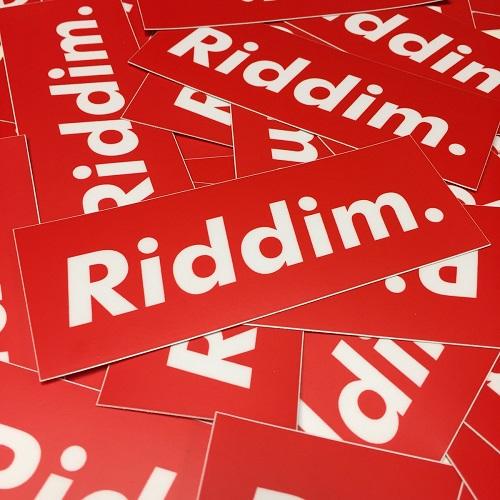
Adapted and summarised from Peter Manuel and Wayne Marshall (2006) – The riddim method: aesthetics, practice, and ownership in Jamaican dancehall.
The term ‘riddim’ is the Jamaican patois spelling of rhythm. A rhythm is defined as movement or procedure with uniform or patterned recurrence of a beat, accent, or the like. For musically inclined aficionados I will delve much deeper into the mechanics of what constitutes a riddim/rhythm later on in the article with reference to dancehall. The more simplistic way to look at it would be the backing track that is used for more than one song.
Origins
Going as far back as 1970, reggae music whose main proponent being dancehall has relied heavily on the riddim culture phenomenon. While a dancehall song consists of a deejay singing (voicing over) a riddim, the riddim is not exclusive to that song, a characteristic not applicable to other genres.
The simplistic explanation is that, Jamaica, a relatively poor country has a huge portion of people in the low income bracket. So, it is natural to minimise the expense of record production by re-using an accompaniment. Get two different songs whilst only having to pay the house band once so to speak. Coincidentally, the majority of the fan base are from low income households. To be fair this argument does make sense but flimsy at best. Why is it only unique to Jamaica, and not any other impoverished area?
In order to understand the riddim culture you need to get to its roots. What was Jamaica like when the genre came to prominence? The twentieth century began with an earthquake that rocked the Jamaican island in 1907. That and the subsequent fire ravaged the island (1000 people death toll) worsening an already precarious financial economy. That said, people were able to go out on weekends as respite to the harsh economic headaches. Queue in sound system parties.
Music on the Jamaican island really came into prominence in the 1940s/50s with mento. Mento classified as Jamaican folk music emerged in the 1940s and was very similar to Calypso which originated from Trinidad (another country in the West Indies). Mixing a culture of former colonists Spain and Britain and the African slavery story, mento demonstrated the fusion and sound of the time. With a strong presence of the guitar, bongo and bango mento mixed in acerbic lyrics of routine life, layed the foundation of what would become ska and eventually reggae.
Ska Music
When Jamaica gained independence from Britain in 1962 this also ushered in a new wave of music called ‘ska’. Ska was a much more upbeat mento. The sound was also heavily influenced by R&B music from the USA which was filtering through. Musicians and singers began to, what is known today as cover, these American songs and imitate the style.
Ska was able to combine mento, American jazz and R&B and was characterized by a walking bass line accented with an on beat rhythm. Developed in the 1960s by Prince Buster, Clement “Coxsone” Dodd, and Duke Reid, ska was played over sound systems to outgoing revellers.
The Jamaican party scene differed from other Hispanic Caribbean party scenes. Cuba and Haiti for example focused more on mariachi band like performances including the accordion. Meanwhile in Kingston, there seemed to be more emphasis on these sound system recordings. Saturday nights in Kingston once constituted going out and listening to US R&B music on sound systems in the 1950s, now had a fresh sound in Ska in the 60’s.
Dancing also played a very big part in shaping the music. It was a big thing in the Jamaican working class community and is was one of the proponents for dancehall which emerged in the 1980s.
Reggae Music
In 1966 Emperor Haile Selassie of Ethiopia visited Jamaica. More than 100,000 Jamaicans turned out to see him and it gave rise to Rastafarian Culture. With Haile Selassie seen as the ‘messiah’ his visit could not have come at a better time. Jamaica was on the brink of civil war, political unrest and had poverty on the rise. With this new insight on life and optimism it ushered in the new age in the form of reggae music.
Reggae had conscious lyrics and it spoke about protest and revolution. The sound had the bass taking charge of the song with a strong presence of drums in the melody. Roots reggae appealed to the ordinary man, with strong Rastafarian teachings of hope. It spoke about the trials and tribulations of the African and artists like Bob Marley and the Wailers eventually put the genre on the map.
Rise of The Deejay (Dj)
Closely related to the origins, the development of the deejay was one of the main proponents of riddim culture. When people would go out listening to sound systems there was always a deejay who would speak out on top of the music encouraging dancing and bigging up whomever. These dj vocalisations became stylish and the in-thing and was considered a form of art. As the riddim culture began to take form the next step was making studio recordings of these deejay turned artist vocalisations. History has it that the first djs to get onto this new phenomena was King Stitt in the 1960s. Another driver in this development was U-Roy, produced by King Tubby. In the 1970s Big Youth & Dennis Alcapone, Lone Ranger and Dillinger took centre stage.
Conclusion
Over[/embed] the past 50 years the dancehall culture has transcended from reggae roots to a very successful viable music genre. The peculiar riddim culture remains the cornerstone to its success. It promotes the artistry of the modern day-deejay and constant innovation of the record producer. With over 1700 accredited record producers the industry is well equipped to remain relevant for decades to come.
With a dynamic environment and increase in streaming the genre is poised to evolve. Its reach is forever growing with the globalisation of huge stars like Sean Paul, Shaggy, Vybz Kartel and Mavado. With that in mind, what is exemplary of the genre is that more people are able to get to the heights of the aforementioned artists because they have equal access to the raw materials so to speak, without the confines of copyright. Enter deejays like Popcaan and Shenseea. The vocalisations of different artists promote a more dynamic framework as opposed to destructive practices. Not to say it is a perfect system. But, the positives outweigh the downside that comes with toxic counterproductive rivalries brought about by gangsterism.
Riddim culture boasts a unique touch to its form. The aesthetic feels like a glamorized remix system that promotes innovation from the artist while remaining relevant to real time issues. RiddimsWorld.com provides a platform to delve into this riddim phenomena as it catalogues these riddims going as far back as the 1970s to modern day releases.
For more well organised and archived riddims, visit RIDDIM-ID. The database is regularly updated and is probably the most accurate online at present as it includes both riddim producer name and label under which the riddim was released
Other references
The rise of reggae: How a uniquely Jamaican sound conquered the world
